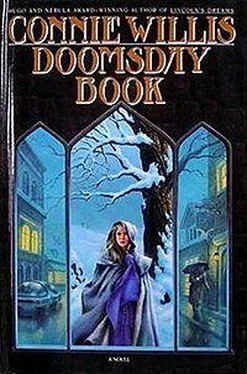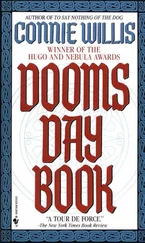Please, Kivrin thought, please, wondering if Dr. Ahrens had suddenly decided Kivrin needed another inoculation or if Dunworthy had raced off to the History Faculty and gotten them to change the rating back to a ten.
Whoever it was must be holding the door open — she could still hear the bell, though she couldn't make out the tune. It wasn't a tune. It was a slow, steady tolling that paused and then went on, and Kivrin thought, I'm through.
She was lying on her left side, her legs sprawled awkwardly as if she had been knocked down by the men who had robbed her, and her arm half-flung over her face to ward off the blow that had sent the blood trickling down the side of her face. The position of her arm should make it possible for her to open her eyes without being seen, but she didn't open them yet. She lay still, trying to listen.
Except for the bell, there was no sound at all. If she were lying on a fourteenth-century roadside, there should be birds and squirrels at least. They had probably been shocked into silence by her sudden appearance or by the net's halo, which left shimmering frostlike particles in the air for several minutes.
After a long minute, a bird twittered, and then another one. Something rustled nearby, then stopped and rustled again. A fourteenth-century squirrel, or a wood mouse. There was a thinner rustle which was probably wind in the branches of the trees, though she couldn't feel any breeze on her face, and above it, from very far away, the distant sound of the bell.
She wondered why it was tolling. It could be ringing vespers. Or matins. Badri had told her he didn't have any idea how much slippage there would be. He had wanted to postpone the drop while he ran a series of checks, but Mr. Gilchrist had said Probability had predicted 6.4 hours maximum slippage.
She didn't know what time she had come through. It had been a quarter to eleven when she came out of prep — she had seen Ms. Montoya looking at her digital and asked her what time it was — but she had no idea how long it had taken after that. It had seemed like hours.
The drop had been scheduled for noon. If she had come through on time and Probability was right about the slippage, it would be six o'clock in the evening, which was too late for vespers. And if it were vespers, why did the bell go on tolling?
It could be tolling for mass, or for a funeral or a wedding. Bells had rung almost constantly in the Middle Ages — to warn of invasions or fires, to help a lost child find its way back to the village, even to ward off thunderstorms. It could be ringing for any reason at all.
If Mr. Dunworthy were here, he'd be convinced it was a funeral. "Life expectancy in 1300 was thirty-eight years," he had told her when she first said she wanted to go to the Middle Ages, "and you only lived that long if you survived cholera and smallpox and blood poisoning, and if you didn't eat rotten meat or drink polluted water or get trampled by a horse. Or get burned at the stake for witchcraft."
Or freeze to death, Kivrin thought. She was beginning to feel stiff with cold though she had been lying there only a little while. Whatever was poking her in the side felt like it had gone through her ribcage and was now puncturing her lung. Mr. Gilchrist had told her to lie there for several minutes and then stagger to her feet, as if coming out of unconsciousness. Kivrin had thought several minutes was hardly enough, considering Probability's assessment of the number of people on the road. It would surely be more than several minutes before a traveller happened along, and she was unwilling to give up the advantage her appearing to be unconscious gave her.
And it was an advantage, in spite of Mr. Dunworthy's idea that half of England would converge on an unconscious woman to rape her while the other half waited nearby with the stake they intended to burn her at. If she were conscious, her rescuers would ask her questions. If she were out cold, they would discuss her and other things besides. They would talk about where to take her and speculate on who she might be and where she might have come from, speculations with a good deal more information in them than "Who are you?" had.
But now she felt an overwhelming urge to do what Mr. Gilchrist had suggested — get up and look around. The ground was cold, her side hurt, and her head was starting to throb in time with the bell. Dr. Ahrens had told her that would happen. Travelling this far into the past would give her symptoms of time lag — headache, insomnia, and a general botch-up of the Circadian rhythms. She felt so cold. Was that a symptom of the time-lag, too, or was the ground she was lying on cold enough to penetrate her fur-lined cloak this quickly? Or was the slippage worse than the tech had thought and it was really the middle of the night?
She wondered if she were lying in the road. If she were, she should certainly not stay there. A fast horse or the wagon that had made the ruts might roll right over her in the dark.
Bells don't ring in the middle of the night, she told herself, and there was too much light filtering through her closed eyelids for it to be dark. But if the bell she could hear was a vespers bell, that would mean it was getting dark, and she had better get up and look around before night fell.
She listened all over again, to the birds, to the wind in the branches, to a steady scraping sound. The bell stopped, the echo of it ringing in the air, and there was a little sound, like an intaken breath or the shuffle of a foot on soft dirt, very close.
Kivrin tensed, hoping the involuntary movement didn't show through her concealing cloak, and waited, but there were no footsteps or voices. And no birds. There was someone, or something, standing over her. She was sure of it. She could hear its breathing, feel its breath on her. It stood there for a long time, not moving. After what seemed like an endless space of time, Kivrin realized she was holding her own breath and let it out slowly. She listened, but now she couldn't hear anything over the throbbing of her own pulse. She took a deep, sighing breath, and moaned.
Nothing. Whatever it was didn't move, didn't make a sound, and Mr. Dunworthy had been right: pretending to be unconscious was no way to come into a century where wolves still prowled the forests. And bears. The birds abruptly began to sing again, which meant either it was not a wolf or the wolf had gone away. Kivrin went through the ritual of listening again, and opened her eyes.
She couldn't see anything but her sleeve, which was against her nose, but just the act of opening her eyes made her head ache worse. She closed her eyes, whimpered, and stirred, moving her arm enough so that when she opened her eyes again she would be able to see something. She moaned again and fluttered her eyes open.
There was no one standing over her, and it wasn't the middle of the night. The sky overhead through the tangled branches of the trees was a pale grayish-blue. She sat up and looked around.
Almost the first thing Mr. Dunworthy had said to her that first time she had told him she wanted to go to the Middle Ages was, "They were filthy and disease-ridden, the muckhole of history, and the sooner you get rid of any fairy-tale notions you have about them, the better."
And he was right. Of course he was right. But here she was, in a fairy wood. She and the wagon and all the rest of it had come through in a little open space too small and shadowed to be called a glade. Tall, thick trees arched above and over it.
She was lying under an oak tree. She could see a few scalloped leaves in the bare branches high above. The oak was full of nests, though the birds had stopped again, traumatized by her movement. The underbrush was thick, a mat of dead leaves and dry weeds that should have been soft but wasn't. The hard thing Kivrin had been lying on was the cap of an acorn. White mushrooms spotted with red clustered near the gnarled roots of the oak tree. They, and everything else in the little glade — the tree trunks, the wagon, the ivy — glittered with the frosty condensation of the halo.
Читать дальше












